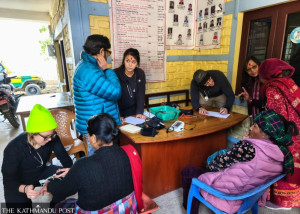Health
Health facilities across the country without birth control shots for months
Failure to purchase the essential family planning means since 2024, appreciation of the dollar, and suspension of USAID grants blamed for critical shortage of contraceptives.
Arjun Poudel
There are only 200 Depo-Provera, a birth control shot, and 350 intrauterine devices, also a birth control means which health workers insert into the uterus, in the store of the Health Logistics Management Centre of Bagmati Province.
These doses of contraception are in stock only because officials kept them despite high demand from health facilities in the province.
“We have been unable to supply Depo-Provera, intrauterine devices (IUD) to health facilities for months due to the lack of those means in stock,” said Nelson Mahat, information officer at the centre. “Demands for means of family planning, especially Depo-Provera and intrauterine devices (IUD), from health facilities are high but we have no stocks to supply. Very few doses have been kept in stock for emergency use.”
Besides, health facilities of Bagmati Province and other provinces across the country also have been without implants and other means of family planning since the start of 2025.
The reason behind the short supply of these essential items is blamed on the failure of federal government agencies to purchase them for around two years, the appreciation of the US dollar against the Nepali rupee and inadequate funding. Suspension of USAID since the start of the year is another major reason for the short supply, according to officials.
Depo-Provera is a popular and widely used contraceptive in Nepal. It is a birth control shot that has the hormone progestin, which often stops the ovaries from releasing eggs.
The IUD is a small, T-shaped device placed in a woman’s womb. It provides contraceptive protection for up to 10 years and can be removed any time. IUD is also a popular means of contraception in Nepal.
“We have not been able to purchase Depo-Provera, IUD, implants and other means of family planning due to price and other issues for a long time,” said Dr Pawan Jung Rayamajhi, director at the management division of the Department of Health Services.
“The purchase of those commodities is still in process and it is taking time.”
Officials admit that the shortage of family planning means for a long time leads to a rise in unintended pregnancies and unsafe abortions.
In Nepal, nearly half of all pregnancies are unintended, and close to two-thirds of them end in abortion, according to a report by the UNFPA.
The UNFPA’s ‘State of World Population 2022’ report, titled “Seeing the Unseen”, says half of the 1.2 million pregnancies in 2017 in Nepal were unintended, and nearly 359,000 ended in abortion.
The report stated that the toll of unintended pregnancies is—and has long been—unseen.
“Although we can estimate healthcare costs, monitor school dropout rates and project levels of workforce attrition due to unintended pregnancies, these only scratch the surface,” the report says. “No number could adequately represent the loss of life, agency and human capital that result from unintended pregnancies.”
Every year, around 100,000 women undergo abortions in Nepal at legally authorised clinics and health facilities. Gynaecologists, however, say the actual number of abortions could be several times the government figure, as many abortions, especially medical ones, go unreported.
The National Demographic Health Survey-2022 shows that 21 percent of currently married women in Nepal have an unmet need for family planning services.
Health ministry officials blame inadequate funding, rise in the dollar price, and suspension of USAID for the shortage of family planning means.
“The government has a commitment to provide contraceptives including birth control shots, IUD and implants free of cost but its own budget is limited,” said Sharmila Dahal, chief of the Family Planning and Reproductive Health Section of the Family Welfare Division under the Department of Health Services.
“We need Rs540 million for family planning programmes but we get only around 100 million as the budget was raised from Rs60 million last year.”
Officials said that the United Nations Population Fund-supplied Depo-Provera and other means have just arrived in the country, which will be supplied to the health facilities at the earliest.
They said that the demand for the contraceptives including birth control shots in the state-run health facilities has risen after the USAID funding to private organisations was suspended in January.




 10.12°C Kathmandu
10.12°C Kathmandu














